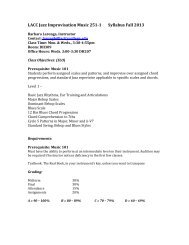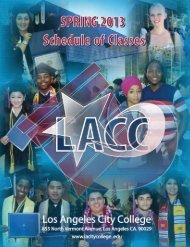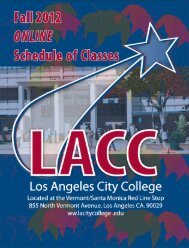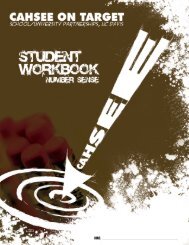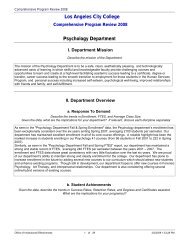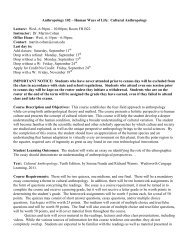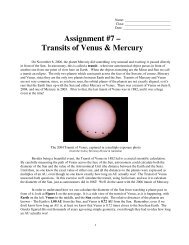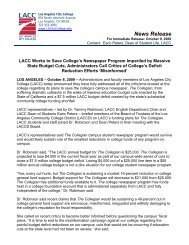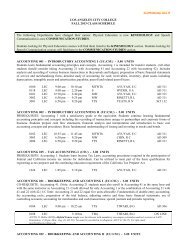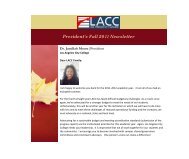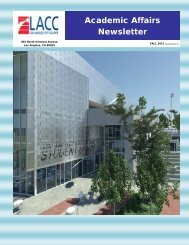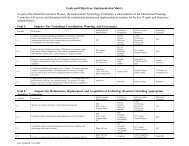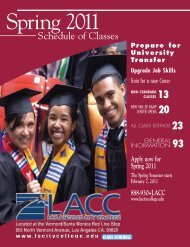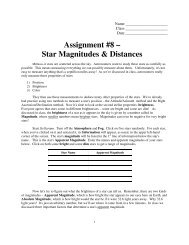Writing Conventions
Writing Conventions
Writing Conventions
You also want an ePaper? Increase the reach of your titles
YUMPU automatically turns print PDFs into web optimized ePapers that Google loves.
CAHSEE on Target<br />
UC Davis, School and University Partnerships<br />
CAHSEE on Target<br />
English Language Arts Curriculum<br />
Published by<br />
The University of California, Davis,<br />
School/University Partnerships Program<br />
2006<br />
Director<br />
Sarah R. Martinez, School/University Partnerships, UC Davis<br />
Developed and Written by<br />
Syma Solovitch, School/University Partnerships, UC Davis<br />
Reviewers<br />
Jennifer Osborne, UC Davis English Graduate<br />
Faith Paul, School/University Partnerships, UC Davis<br />
Linda Whent, School/University Partnerships, UC Davis<br />
Sarah Rees, School/University Partnerships, UC Davis<br />
Design and Layout<br />
Bo Botelli, Publications Coordinator<br />
Jack Zhang, Publications Assistant<br />
Advising Services, UC Davis<br />
The CAHSEE on Target curriculum was made possible by<br />
funding and support from the California Academic Partnership Program,<br />
GEAR UP, and the University of California Office of the President.<br />
We also gratefully acknowledge the contributions of those teachers<br />
and administrators at Sacramento High School and Woodland High School<br />
who piloted the CAHSEE on Target curriculum.<br />
© Copyright The Regents of the University of California, Davis campus, 2005-06<br />
All Rights Reserved. Pages intended to be reproduced for students activities<br />
may be duplicated for classroom use. All other text may not be reproduced in any form<br />
without the express written permission of the copyright holder.<br />
For further information,<br />
please visit the School/University Partnerships Web site at:<br />
http://sup.ucdavis.edu
CAHSEE CAHSEE on on Target<br />
Target<br />
Introduction to the CAHSEE<br />
UC Davis, School and University Partnerships<br />
Answer Key: <strong>Writing</strong> <strong>Conventions</strong> Strand<br />
The CAHSEE stands for the California High School Exit Exam.<br />
The English Language Arts section of the CAHSEE consists of<br />
72 multiple-choice questions (45 reading items and 27 writing items)<br />
and one essay (accounting for 18% of the section).<br />
The items span across 6 distinct strands:<br />
• Word Analysis: 7 Questions<br />
• Reading Comprehension (Informational Text): 18 Questions<br />
• Literary Response & Analysis: 20 Questions<br />
• <strong>Writing</strong> <strong>Conventions</strong>: 15 Questions<br />
• <strong>Writing</strong> Strategies: 12 Questions<br />
• <strong>Writing</strong> Applications: 1 Essay (18% of the total score)<br />
What is<br />
CAHSEE on Target?<br />
CAHSEE on Target is a tutoring<br />
course specifically designed for<br />
the California High School Exit Exam<br />
(CAHSEE). The goal of the program is to<br />
pinpoint each student’s areas of weakness<br />
and to then address those weaknesses<br />
through classroom and small group instruction,<br />
concentrated review, computer tutorials and<br />
challenging games.<br />
Each student will receive a separate workbook for<br />
each strand and will use these workbooks during<br />
their tutoring sessions. These workbooks will<br />
present and explain each concept covered<br />
on the CAHSEE, and introduce effective<br />
strategies for reading comprehension,<br />
essay writing, and text revision.
CAHSEE on Target<br />
<strong>Writing</strong> <strong>Conventions</strong> Strand<br />
UC Davis, School and University Partnerships<br />
Answer Key: <strong>Writing</strong> <strong>Conventions</strong> Strand<br />
On the CAHSEE, you will be tested on basic conventions (rules) of punctuation, capitalization,<br />
grammar, and usage. This strand consists of 5 multiple-choice questions: For each question,<br />
you will be given one sentence and four answer choices.<br />
CAHSEE Examples: Here are two questions that appeared on past exams.<br />
. When our parents celebrate their silver wedding anniversary later this year,<br />
they were married for twenty-five years.<br />
A. they will have been married for twenty-five years.<br />
B. they have been married for twenty-five years.<br />
C. they would have been married for twenty-five years.<br />
D. Leave as is.<br />
2. If Mark will have made fewer errors, he will have passed his driving test.<br />
A. If Mark would have made fewer errors, he would have passed his driving test.<br />
B. If Mark had made fewer errors, he would have passed his driving test.<br />
C. If Mark would of made fewer errors, he would have passed his driving test.<br />
D. Leave as is.<br />
2
CAHSEE on Target<br />
UC Davis, School and University Partnerships<br />
Answer Key: <strong>Writing</strong> <strong>Conventions</strong> Strand<br />
<strong>Writing</strong> <strong>Conventions</strong> Skills and Concepts<br />
Tested on the CAHSEE<br />
The <strong>Writing</strong> <strong>Conventions</strong> skills and concepts tested on the CAHSEE can be<br />
broken into nine broad topics:<br />
I. Subject-Verb Agreement<br />
II. Pronoun-Antecedent Agreement<br />
III. Punctuation<br />
A. Commas<br />
B. Semicolons<br />
C. Colons<br />
D. Quotation Marks<br />
E. Underlining/Italics<br />
IV. Capitalization<br />
V. Adjectives<br />
VI. Parallel Structure<br />
VII. Modifier Placement<br />
VIII. Shift in Tense<br />
IX. Commonly Confused Words
CAHSEE on Target<br />
Unit 1: Subject-Verb Agreement<br />
A. Identifying the Subject and Verb<br />
UC Davis, School and University Partnerships<br />
Answer Key: <strong>Writing</strong> <strong>Conventions</strong> Strand<br />
Subject: The subject of a sentence is the noun (a person, place or thing) or<br />
pronoun (a word that can substitute for a noun) that is either doing something<br />
or being something.<br />
Examples of Nouns:<br />
Motorcycle Basketball Coach Love<br />
Examples of Pronouns:<br />
I You He She It We They<br />
Verb: A verb is a word that expresses action or state of being.<br />
Examples of action verbs:<br />
go run fly jump sit stand sleep<br />
Examples of being verbs:<br />
am is are was were<br />
Finding the Subject: In order to identify the subject of a sentence, find the verb and ask,<br />
“Who is doing this action (or who is in this state of being)?” The answer is the subject.<br />
Example: The girls ran down the street.<br />
What is the verb in this sentence?<br />
What is the subject? (Who did the action?)<br />
In this example, we have a simple subject because there is only one noun functioning<br />
as the subject of the sentence.
CAHSEE on Target<br />
UC Davis, School and University Partnerships<br />
Answer Key: <strong>Writing</strong> <strong>Conventions</strong> Strand<br />
On Your Own: Underline the simple subject of each sentence:<br />
. Laurie followed her home yesterday.<br />
2. The dog chased the cat.<br />
. The telephone is in the next room.<br />
. The picture is hanging on the wall.<br />
5. The secretary was late for work this morning.<br />
6. Danielle was given an extra piece of cake.<br />
Compound Subject<br />
Sometimes the subject may consist of two or more nouns, joined by joined by and or or.<br />
We call this a “compound” subject.<br />
Example: Martha and Stanley met me at 1:00 p.m.<br />
Who met me at :00 p.m.? The answer is Martha and Stanley.<br />
The sentence has a compound subject.<br />
On Your Own: Underline the compound subject in each sentence:<br />
. The man and his son stopped by the store on their way home.<br />
2. Have your sister and brother ever attended this school?<br />
. Your coat and gloves are hanging in the closet.<br />
5
CAHSEE on Target<br />
B. Rules for Subject-Verb Agreement<br />
UC Davis, School and University Partnerships<br />
Answer Key: <strong>Writing</strong> <strong>Conventions</strong> Strand<br />
Subject-verb agreement means that if the subject is singular (one person, place or thing),<br />
the verb is singular as well; if the subject is plural (more than one person, place or thing),<br />
the verb is plural.<br />
I. If a sentence contains a compound subject (two or more nouns or pronouns joined<br />
by and), the verb is plural.<br />
Example: Cynthia and Jody are best friends.<br />
II. If a compound subject contains two or more singular nouns or pronouns,<br />
connected by or or nor, the verb is singular.<br />
Example: Cynthia or Jody is going to the party.<br />
On Your Own: If the verb agrees with the subject, write C beside the sentence.<br />
If not, correct the sentence.<br />
. Either Cynthia or Fred are able to make the trip.<br />
2. David and his brother is attending Lincoln High School.<br />
. Neither David nor his brother is attending Lincoln High School.<br />
6
CAHSEE on Target<br />
UC Davis, School and University Partnerships<br />
Answer Key: <strong>Writing</strong> <strong>Conventions</strong> Strand<br />
III. On the other hand, if a compound subject contains both a singular and<br />
plural noun joined by or or nor, the verb agrees with the noun closest to the verb.<br />
Example: Jody or her sisters are going to the party.<br />
plural<br />
Example: Either Jody’s sisters or her cousin is going to the party.<br />
singular<br />
Example: Neither Cynthia nor Jody is going to the party.<br />
singular<br />
On Your Own: If the verb agrees with the subject, write C beside the sentence.<br />
If not, correct the sentence.<br />
. Neither the cows nor the horse are in the barn.<br />
2. Either the horse or the cows are in the barn.<br />
. Neither the three daughters nor the one son have visited the Grand Canyon.<br />
. Neither the one son nor the three daughters have visited the Grand Canyon.
CAHSEE on Target<br />
UC Davis, School and University Partnerships<br />
Answer Key: <strong>Writing</strong> <strong>Conventions</strong> Strand<br />
IV. When either and neither appear as the subject of the sentence, the verb is singular.<br />
Example: Either is fine with me.<br />
Note: Either stands for “either one.”<br />
Example: Neither is right.<br />
Note: Neither stands for “neither one.”<br />
Now look at the next example:<br />
Example: Either of the two is fine with me.<br />
Notice that the verb is singular, even though the phrase “of the two” comes<br />
right before it. The subject of the sentence is “either” and the verb must agree<br />
in number with the subject.<br />
On Your Own: Circle the correct verb.<br />
. Neither of them was / were in the room.<br />
2. Neither of them has / have my number.<br />
. Either is / are a reasonable option.
CAHSEE on Target<br />
UC Davis, School and University Partnerships<br />
Answer Key: <strong>Writing</strong> <strong>Conventions</strong> Strand<br />
V. The verb is always singular with the following words:<br />
• Each<br />
• Everyone<br />
• Everybody<br />
• Anybody<br />
• Anyone<br />
• Nobody<br />
• Somebody<br />
• Someone<br />
• One<br />
• No one<br />
Example: Everyone of them is invited to the party.<br />
Example: Each one of us has a copy.<br />
On Your Own: Underline the subject (simple or compound)<br />
in each sentence. If the verb agrees with the subject, write C<br />
beside the sentence. If not, correct the sentence.<br />
. Anybody who has ever traveled to Rome, Florence,<br />
and Venice know that Italy is a beautiful country.<br />
2. No one is allowed to play in the parking lot.<br />
. Everyone who comes to their parties have a wonderful time.
CAHSEE on Target<br />
UC Davis, School and University Partnerships<br />
Answer Key: <strong>Writing</strong> <strong>Conventions</strong> Strand<br />
VI. The verb is always plural with the following words:<br />
• All<br />
• Both<br />
• Few<br />
• Many<br />
• Several<br />
• Some<br />
Example: All of the boys are invited to the party.<br />
Example: Both of them are invited to the party.<br />
Example: Few are invited to the party.<br />
Example: Several of them are invited to the party.<br />
On Your Own: Underline the subject (simple or compound) in each sentence.<br />
If the verb agrees with the subject, write C beside the sentence.<br />
If not, correct the sentence.<br />
. Several of you has known me for quite some time.<br />
2. Some of the teachers have been at the school for over 25 years.<br />
0
CAHSEE on Target<br />
UC Davis, School and University Partnerships<br />
Answer Key: <strong>Writing</strong> <strong>Conventions</strong> Strand<br />
VII. The verb agrees with the subject of the sentence, regardless of what<br />
comes between the subject and the verb.<br />
Example: The teacher who has more than 34 students is in need of<br />
an assistant.<br />
Look at the sentence below. Underline the subject and explain why<br />
the verb is singular:<br />
Example: Only one of the four hundred candidates who applied was<br />
eligible for the job.<br />
Explanation: Verb is singular because the subject (one) is singular.<br />
The four hundred candidates is the object of the preposition (of),<br />
not the subject.<br />
On Your Own: Underline the subject (simple or compound) in each<br />
sentence. If the verb agrees with the subject, write C beside the<br />
sentence. If not, correct the sentence.<br />
. The teacher, along with her students, is taking a trip to<br />
Yosemite next spring.<br />
2. The math exam, which includes all six strands, are very<br />
challenging.<br />
. The teacher with the most students has been chosen to lead<br />
the next assembly.<br />
. One of you knows the correct answer but does not choose to<br />
share it.
CAHSEE on Target<br />
UC Davis, School and University Partnerships<br />
Answer Key: <strong>Writing</strong> <strong>Conventions</strong> Strand<br />
Practice: Underline the subject (simple or compound) in each sentence. If the verb agrees<br />
with the subject, write C beside the sentence. If not, correct the sentence.<br />
. The gift from my mother, father, and grandparents were very much appreciated.<br />
2. At the very bottom of the hills stand an old fortress.<br />
. In the box, there is a marble, a doll, and a toy whistle.<br />
. A compass or a flashlight are essential when hiking in the woods.<br />
5. Neither the first book nor the second one was very good.<br />
6. My mother, along with her friend Daisy, are coming to my party.<br />
2
CAHSEE on Target<br />
UC Davis, School and University Partnerships<br />
Answer Key: <strong>Writing</strong> <strong>Conventions</strong> Strand<br />
Unit II: Pronoun-Antecedent Agreement<br />
A pronoun is a word that substitutes for a noun that came previously in the sentence.<br />
This noun is called the antecedent. Just as subjects and verbs must agree, pronouns must<br />
agree with their antecedents.<br />
Rules for Pronoun-Antecedent Agreement<br />
I. The pronoun must agree in number.<br />
a. If the antecedent is singular, the pronoun must be singular:<br />
Example: I have used this cleaning service. It is very reliable.<br />
The pronoun “it” (in the second sentence) refers back to the noun “service”;<br />
since service is singular, so too is the pronoun it.<br />
b. If the antecedent is plural, the pronoun must be plural.<br />
Example: Yesterday, I saw Sue and Steve. They are planning a trip to Jamaica.<br />
The pronoun “they” refers back to “Sue and Steve.” Therefore the pronoun<br />
is plural.<br />
On Your Own: Fill in the second part of the sentence with the<br />
correct pronoun. Be sure that it agrees in number.<br />
. Dave is attending UC Davis. is majoring in Biology.<br />
2. Karen and I have known one another for 0 years;<br />
are best friends.<br />
. Rachel and Dave got engaged; plan to<br />
marry in June.
CAHSEE on Target<br />
UC Davis, School and University Partnerships<br />
Answer Key: <strong>Writing</strong> <strong>Conventions</strong> Strand<br />
II. A pronoun can be the subject or object of a sentence.<br />
How do you know if a noun is serving as the subject or object of a sentence?<br />
Think about it this way:<br />
The subject is the one who does the doing.<br />
The object is the one to whom the doing is done.<br />
Example: I like him.<br />
Who likes him? (This is the subject.)<br />
Who is liked? (This is the object.)<br />
Example: Jason threw the ball.<br />
Who threw the ball? (This is the subject.)<br />
What did Jason throw? (This is the object.)<br />
Pronouns as Subjects Pronouns as Objects<br />
I I went to the game. Me She took me to the game.<br />
You You did a great job! You I want to thank you.<br />
He He is always late. Him I saw him yesterday.<br />
She She is eighteen years old. Her I asked her to finish.<br />
It It is a difficult decision. It I put it on the table.<br />
We We are starting college. Us She hugged us both.<br />
You You are all invited. You I am inviting you all.<br />
They They arrived yesterday. Them I heard them outside.
CAHSEE on Target<br />
UC Davis, School and University Partnerships<br />
Answer Key: <strong>Writing</strong> <strong>Conventions</strong> Strand<br />
III. When pronouns are follow prepositions, they serve as objects because prepositions<br />
are always followed an object.<br />
Prepositions are generally those small words showing the relationship between<br />
two or more nouns.<br />
Examples of Prepositions: to, from, near, on, in, with, for, through<br />
Sentence Subject Preposition Object<br />
I go to the store. I to store<br />
The book is from me. book from me<br />
The school is near her. school near her<br />
The phone is one the table. phone on table<br />
The pen is in the desk. pen in desk<br />
The checks are with him. checks with him<br />
The gift is from my husband and me. gift from my husband and me<br />
On Your Own: Underline all of the objects in each sentence below.<br />
(Note: There may be more than one object for each sentence.)<br />
. I received a letter from them.<br />
2. Louise sent the book to us.<br />
. The bird flew through the window.<br />
. William lives near them.<br />
5. He made the cake for you.<br />
6. Please put it on the table.<br />
5
CAHSEE on Target<br />
UC Davis, School and University Partnerships<br />
Answer Key: <strong>Writing</strong> <strong>Conventions</strong> Strand<br />
IV. Compound objects do not change the rule.<br />
Look at the sentence: “The gift is from my husband and me.”<br />
Here, we have a compound object:<br />
st object: my husband<br />
2 nd object: me<br />
People often make the error of writing “from my husband and I.”<br />
One way to check is to cross out the words “my husband and”:<br />
The gift is from my husband and ____.”<br />
Would you write “from I” or “from me”?<br />
On Your Own: Underline the preposition in each sentence<br />
and circle the correct pronoun(s).<br />
. They live near Jody and _____.<br />
a. I<br />
b. me<br />
2. I gave the number to Marla and _____.<br />
a. he<br />
b. him<br />
YOU AND ME<br />
6
CAHSEE on Target<br />
UC Davis, School and University Partnerships<br />
Answer Key: <strong>Writing</strong> <strong>Conventions</strong> Strand<br />
Practice: Circle the correct pronoun(s) for each sentence.<br />
. They invited he / him and I / me to the reception.<br />
2. The book was for he / him, not I / me.<br />
. Please accept this small gift from my mother and I / me.<br />
. The book is mine / mines so please leave it there.<br />
5. Either Donna or I / me will pick up the cake.<br />
6. Neither Donna nor I / me will pick up the cake.<br />
. I went to the drugstore but found it / them closed.<br />
Released CAHSEE Items on Pronoun Use:<br />
. The musician played Wendy’s favorite waltz for her husband and ____.<br />
A. I<br />
B. he<br />
C. she<br />
D. her<br />
2. What we didn’t expect is that ______________________ would finish<br />
our project a week ahead of schedule.<br />
A. she and me<br />
B. she and I<br />
C. her and I<br />
D. her and me
Unit III: Punctuation<br />
A. Commas<br />
CAHSEE on Target<br />
UC Davis, School and University Partnerships<br />
Answer Key: <strong>Writing</strong> <strong>Conventions</strong> Strand<br />
. Use a comma to join two independent part of a sentence;<br />
these parts are called clauses.<br />
Example: Melanie threw the ball in the air, and Eleanor caught it.<br />
2. Use a comma to list items in a series.<br />
Example: Snorkeling, rowing, and swimming are my favorite water sports.<br />
. Use commas to separate cities and states.<br />
Example: Raleigh, North Caroline is very hot in the summer.<br />
. Use commas to separate days from months, and dates from years.<br />
Example: He was born on Friday, February 18, 2005.<br />
5. Use a comma to set off clauses, particularly those that come at<br />
the beginning of a sentence.<br />
Example: With all of her might, Melanie threw the ball.
CAHSEE on Target<br />
UC Davis, School and University Partnerships<br />
Answer Key: <strong>Writing</strong> <strong>Conventions</strong> Strand<br />
6. Use a comma to set off the following adverbs, either at the beginning<br />
of the sentence or in the middle:<br />
• furthermore<br />
• moreover<br />
• nevertheless<br />
• however<br />
• fortunately<br />
• in fact<br />
Example: Furthermore, Melanie threw the ball with all of her might.<br />
. Use commas to set off information that is not essential.<br />
Example: The woman, who introduced me to my first wife, lives in this house.<br />
Contrast this with the following sentence. How is the meaning different in<br />
the second example?<br />
Example: The woman who introduced me to my first wife lives in this house.<br />
Explain the difference:
Practice: Place commas where needed<br />
CAHSEE on Target<br />
UC Davis, School and University Partnerships<br />
Answer Key: <strong>Writing</strong> <strong>Conventions</strong> Strand<br />
. The filthy decrepit building was in no shape to be rented.<br />
2. Next time you travel to Buffalo New York try their famous chicken wings.<br />
. I watched the news all night but didn’t see coverage of the election.<br />
. Friday April is a holiday.<br />
5. For the most part I see much improvement in your work.<br />
6. After brushing my teeth and combing my hair I sat down at the kitchen table<br />
and ate breakfast.<br />
. Once a long time ago I saw a sparrow.<br />
. My neighbor a defense attorney works for a large law firm.<br />
. I do however have her phone number.<br />
20
B. Semicolons (;)<br />
CAHSEE on Target<br />
UC Davis, School and University Partnerships<br />
Answer Key: <strong>Writing</strong> <strong>Conventions</strong> Strand<br />
There are two major rules for using semicolons:<br />
. Use a semicolon to join two independent clauses.<br />
(Each clause could stand alone as a complete sentence.)<br />
Example: I don’t know how she can get my address;<br />
she doesn’t even know my last name.<br />
The following adverbs are often used as transitions between<br />
independent clauses:<br />
• furthermore<br />
• moreover<br />
• nevertheless<br />
• however<br />
• fortunately<br />
• in fact<br />
Example: I worked very hard; in fact, I spent my weekends at the office.<br />
Example: I do not intend to pay this bill; furthermore, I plan to contact<br />
your supervisor and make a formal complaint.<br />
2. Use a semicolon to separate items in a series when the individual items<br />
already contain commas.<br />
Example: We traveled to all of the great cities of Europe, including<br />
Rome, Italy; Paris, France; and Athens, Greece.<br />
2
CAHSEE on Target<br />
UC Davis, School and University Partnerships<br />
Answer Key: <strong>Writing</strong> <strong>Conventions</strong> Strand<br />
Practice: Edit the following sentences for correct punctuation<br />
(commas and/or semi-colons). If no editing is needed, write C.<br />
. Jeffrey knew the right thing to do in fact he had always known.<br />
2. I know you have the best prices however you do not have the<br />
best quality?<br />
. The salesclerk forgot to give me her business card fortunately<br />
I remember the name of the store and will look it up in the phone book.<br />
. I subscribe to the daily newspapers The New York Times<br />
The Wall Street Journal and The Washington Post the weekly<br />
magazines Newsweek Time and The Economist and the monthly<br />
magazines National Geographic Golf Digest and Harpers.<br />
5. The race began in the morning it ended in the afternoon.<br />
6. I tried reaching her over the weekend but I did not get a response.<br />
. Rick’s Market offers the best prices however the quality of<br />
the fruit is superior at the store across the street.<br />
. Monica was very disappointed in her performance<br />
she was nevertheless a gracious loser.<br />
22
CAHSEE on Target<br />
UC Davis, School and University Partnerships<br />
Answer Key: <strong>Writing</strong> <strong>Conventions</strong> Strand<br />
. I have never been to Mexico but I have always wanted to travel there.<br />
0. Jason who is the youngest in the family was born August 20 .<br />
. Allison didn’t feel well however she came to school anyway.<br />
2. It was a hot windy day but I spent the afternoon working<br />
in the garden.<br />
. Heather enrolled in Calculus French History and AP English.<br />
. Kendra has never liked dogs she has always preferred to own a cat.<br />
5. Amy who was the valedictorian of her graduating class<br />
received a full scholarship to college.<br />
2
C. Colons (:)<br />
CAHSEE on Target<br />
UC Davis, School and University Partnerships<br />
Answer Key: <strong>Writing</strong> <strong>Conventions</strong> Strand<br />
The colon is a stronger mark of punctuation than either the comma<br />
or the semi-colon, but not as strong as an end mark as the period,<br />
the question mark, or the exclamation point. It has three main uses:<br />
. To introduce a list of words or phrases following a complete sentence<br />
Example: I have several favorite breakfast foods: pancakes, eggs, and waffles.<br />
2. To express the time<br />
Example: I eat lunch at 12:30 pm every day.<br />
. After the greeting in a business letter<br />
Example: Dear Mr. Robinson:<br />
On Your Own: Correct each sentence by inserting a colon in the proper place:<br />
. A banana split requires the following ingredients: ice cream, whipped cream,<br />
nuts, chocolate syrup, strawberry topping, bananas, and cherries for the top.<br />
2. I would like to get these three things for my birthday: a bike, a lacrosse stick,<br />
and a puppy.<br />
2
D. Quotation Marks (“ ”)<br />
CAHSEE on Target<br />
UC Davis, School and University Partnerships<br />
Answer Key: <strong>Writing</strong> <strong>Conventions</strong> Strand<br />
Direct quotations are another person’s exact words--either spoken or written.<br />
. Quotation marks are placed around the actual words spoken or thought.<br />
Quotes begin with a capital letter and end after the final punctuation mark<br />
(comma, question mark, exclamation mark).<br />
Example: “You misunderstand me,” said the man.<br />
Example: “Do you understand?” he asked.<br />
Example: “Well!” said the man.<br />
2. If the quotation appears in the second half of the sentence, a comma is<br />
needed to separate the quote and the person to whom the quote is attributed.<br />
Example: The man said, “You misunderstand me.”<br />
Example: He asked, “Do you understand?”<br />
Example: The man said, “Well!”<br />
25
CAHSEE on Target<br />
UC Davis, School and University Partnerships<br />
Answer Key: <strong>Writing</strong> <strong>Conventions</strong> Strand<br />
. If a quote is split in two . . .<br />
• st part begins with a capital letter and ends with a comma<br />
• 2 nd part begins with a lower case letter.<br />
• Both parts should be enclosed by quotation marks.<br />
Example: “He likes to talk about football,” she said, “especially when<br />
the Super Bowl is coming up.”<br />
. Use quotation marks for . . .<br />
• Titles of short published works, such as songs, short stories, essays,<br />
short poems, and one-act plays.<br />
Example: The story “A Perfect Day for Banana Fish” appears in<br />
the short story collection Nine Stories by J.D. Salinger.<br />
• Titles of chapters in books; articles in newspapers, magazines<br />
and journals; episodes of television and radio series.<br />
Example: Did you happen to read the article “Moonshine” in<br />
The New York Times?<br />
26
CAHSEE on Target<br />
UC Davis, School and University Partnerships<br />
Answer Key: <strong>Writing</strong> <strong>Conventions</strong> Strand<br />
Practice: Add correct punctuation. Write C if the sentence is correct.<br />
. Sam asked when are we coming back.<br />
2. What will I do without a voice thought Louis.<br />
. His father said it’s time for bed.<br />
. Watch me said the mother swan and do everything I do.<br />
5. Call the police yelled the salesgirl.<br />
6. No the teacher replied you cannot hand in the<br />
assignment late.<br />
. Marvin answered I think that the best way to reach Sacramento is to take the interstate.<br />
In fact at this time of day you’re likely to get there much faster that way.<br />
. Brenda asked are you going out tonight.<br />
. My favorite song is Get on the Good Foot by James Brown.<br />
0. I can’t believe it said Tom next year you will be years old.<br />
2
E. Italics/Underlining<br />
CAHSEE on Target<br />
UC Davis, School and University Partnerships<br />
Answer Key: <strong>Writing</strong> <strong>Conventions</strong> Strand<br />
Material that is italicized in print or by computer is underlined in hand-written work.<br />
Italics & Underlining Rules<br />
. Underline (or italicize - - if using a computer) the titles of books, long plays,<br />
long poems, periodicals, newspapers and magazines.<br />
Example: I subscribe to the magazines Time and Newsweek.<br />
2. Underline (or italicize) titles of long musical works and motion pictures;<br />
of ships, aircraft and trains.<br />
Example: How many times have you seen Spiderman?<br />
On Your Own: Edit the following sentences for italics (or underlining):<br />
. I begin each morning by reading The New York Times.<br />
2. My favorite play is Hamlet by William Shakespeare.<br />
. The Sacramento Theater Company is performing the musical Hairspray.<br />
2
CAHSEE on Target<br />
UC Davis, School and University Partnerships<br />
Answer Key: <strong>Writing</strong> <strong>Conventions</strong> Strand<br />
Released CAHSEE Items on Punctuation:<br />
. When Tom arrived at school he was carrying all his books with him.<br />
A. arrived at school, he<br />
B. arrived, at school he<br />
C. arrived at school he,<br />
D. Leave as is.<br />
2. After, the volcano erupted, the tiny tropical island was quiet and devastated.<br />
A. After the volcano erupted, the<br />
B. After the volcano erupted the<br />
C. After the volcano erupts, the<br />
D. Leave as is.<br />
. The frightened pilot’s face was ashen as he gingerly lowered the plane onto the Smith’s<br />
private ___________ that time was running out for his ailing friend.<br />
A. runway: he knew<br />
B. runway, he knew<br />
C. runway. He knew<br />
D. runway but he knew<br />
. While Sara visited with Sam: she finished her science project.<br />
A. with Sam. She finished<br />
B. with Sam; she finished<br />
C. with Sam, she finished<br />
D. Leave as is.<br />
2
CAHSEE on Target<br />
UC Davis, School and University Partnerships<br />
Answer Key: <strong>Writing</strong> <strong>Conventions</strong> Strand<br />
5. _______________ is a book written by Harper Lee.<br />
A. To Kill a Mockingbird<br />
B. “To Kill a Mockingbird”<br />
C. To Kill a Mockingbird<br />
D. “To Kill a Mockingbird”<br />
6. “Why should I wear a sweater?” grumbled the boy as his mother reminded<br />
him again of the cold weather.<br />
A. ‘Why should I wear a sweater’?<br />
B. “Why should I wear a sweater”<br />
C. “Why should I wear a sweater”?<br />
D. Leave as is.<br />
. If you want to add your name to the list of volunteers; please go to Room 2.<br />
A. list of volunteers please;<br />
B. list of volunteers, please<br />
C. list of volunteers: please<br />
D. Leave as is.<br />
. My sister a high school freshman, is trying out for the school play.<br />
A. sister, a high school freshman,<br />
B. sister: a high school freshman<br />
C. sister a high school freshman<br />
D. Leave as is.<br />
0
CAHSEE on Target<br />
UC Davis, School and University Partnerships<br />
Answer Key: <strong>Writing</strong> <strong>Conventions</strong> Strand<br />
. Mr. Forbes needs the following items for his cooking class flour, salt,<br />
and a variety of spaces.<br />
A. cooking class: flour, salt, and a variety of spices<br />
B. cooking class; flour, salt, and a variety of spices<br />
C. cooking class, flour, salt, and a variety of spices<br />
D. Leave as is.<br />
0. The Alaskan rivers are clear and sparkling in summer however, they are frozen in winter.<br />
A. in summer, however they are frozen in winter.<br />
B. in summer; however, they are frozen in winter.<br />
C. summer: however they are frozen in winter.<br />
D. Leave as is.
CAHSEE on Target<br />
UC Davis, School and University Partnerships<br />
Answer Key: <strong>Writing</strong> <strong>Conventions</strong> Strand<br />
Unit IV: Capitalization Rules<br />
. Capitalize the first letter of every sentence.<br />
Example: My brother’s name is Max. My sister’s name is Monique.<br />
2. Capitalize the title of a person when the title is followed by the person’s name.<br />
Otherwise, the title should not be capitalized.<br />
Example: Yesterday, Mayor Johnson came to visit our class.<br />
Example: Yesterday, the mayor came to visit our class.<br />
. Capitalize proper nouns (names of specific persons, places, and things.)<br />
Do not capitalize common nouns.<br />
Proper Nouns Common Nouns<br />
Lake Champlain It is a small lake.<br />
We live out West. (a specific region) Go west.<br />
The University of California It is a great university.<br />
I am taking Biology II. I am taking biology.<br />
District Attorney Martinez the district attorney<br />
St. Peter’s Church It is a very large church.<br />
2
CAHSEE on Target<br />
UC Davis, School and University Partnerships<br />
Answer Key: <strong>Writing</strong> <strong>Conventions</strong> Strand<br />
. Capitalize the days of the week, months of the year, and holidays.<br />
Example: Christmas Day is December 25. This year, it falls on a Sunday.<br />
5. Capitalize all nouns, verbs, adjectives, and adverbs in titles of books,<br />
articles, and songs. (Do not capitalize articles, prepositions, or coordinating<br />
conjunctions unless they are the first word of the title).<br />
Example: Alice in Wonderland was written by Lewis Carroll (book title)<br />
Example: “I Want to Hold Your Hand” was sung by the Beatles (song title)<br />
6. Capitalize the first word in a quotation.<br />
Example: My mother once said, “The best things in life are free.”<br />
. Do not capitalize anything that is paraphrased.<br />
Example: My mother once said that the best things in life are free.
CAHSEE on Target<br />
UC Davis, School and University Partnerships<br />
Answer Key: <strong>Writing</strong> <strong>Conventions</strong> Strand<br />
Practice: Edit the following sentences for correct capitalization.<br />
If correct, place a C in the margin.<br />
. I spoke with the President of the organization yesterday.<br />
2. Do you know if President Bush traveled to California this month?<br />
. My favorite book is The Grapes of Wrath by John Steinbeck.<br />
. A wise man once said, “a happy person is a successful person.”<br />
5. A wise man once said that a happy person is a successful person.<br />
6. I bought a new bonnet for easter Sunday.<br />
. Thanksgiving always falls on a thursday.<br />
. This year I am taking algebra and physics.<br />
. Next year I will take algebra II and world history I.<br />
0. Have you read the play Romeo And Juliet?<br />
. The Mayor of the town is a wonderful orator.
Unit V: Adjectives<br />
CAHSEE on Target<br />
UC Davis, School and University Partnerships<br />
Answer Key: <strong>Writing</strong> <strong>Conventions</strong> Strand<br />
A. Comparative Adjectives: To compare two things:<br />
Example: Bridget is taller than Michael.<br />
I. Short Adjective Examples: add ‘-er’ to the end of the word<br />
Adjective Comparative<br />
Young Younger<br />
Fast Faster<br />
Slow Slower<br />
Big Bigger<br />
Small Smaller<br />
Busy Busier<br />
Easy Easier<br />
Exceptions<br />
Good/Well Better<br />
Bad Worse<br />
II. Long Adjective Examples: Precede the adjective with ‘more’<br />
Beautiful More beautiful<br />
5
CAHSEE on Target<br />
UC Davis, School and University Partnerships<br />
Answer Key: <strong>Writing</strong> <strong>Conventions</strong> Strand<br />
B. Superlative Adjectives: To compare three or more things:<br />
Example: Bridget is the tallest student in the class.<br />
I. Short Adjective Examples: add ‘-est’ to the end of the word<br />
Adjective Superlative<br />
Young Youngest<br />
Fast Fastest<br />
Slow Slowest<br />
Big Biggest<br />
Small Smallest<br />
Busy Busiest<br />
Easy Easiest<br />
Exceptions<br />
Good/Well Best<br />
Bad Worst<br />
II. Long Adjective Examples: Precede the adjective with ‘most’<br />
Beautiful Most beautiful<br />
6
5 ft<br />
4 ft<br />
3 ft<br />
2 ft<br />
1 ft<br />
CAHSEE on Target<br />
UC Davis, School and University Partnerships<br />
Answer Key: <strong>Writing</strong> <strong>Conventions</strong> Strand<br />
Practice: Circle the best answer choice.<br />
. Who is the _______ among the three of you?<br />
A. more tall<br />
B. taller<br />
C. most tall<br />
D. tallest<br />
2. I am the ____ of the two.<br />
A. young<br />
B. younger<br />
C. youngest<br />
D. most young<br />
. This is the _____ paper that I have ever seen.<br />
A. baddest<br />
B. worse<br />
C. worst<br />
D. worstest<br />
E. most worst<br />
. This assignment was _____ than the last one.<br />
A. difficult<br />
B. difficulter<br />
C. more difficult<br />
D. difficultest<br />
5. This purse cost the _____ of all.<br />
A. less<br />
B. lesser<br />
C. least<br />
D. leasest
6. Edna is _________ than Rachel.<br />
A. responsibler<br />
B. more responsible<br />
C. responsiblest<br />
D. most responsible<br />
CAHSEE on Target<br />
. She has ________ ice cream than I.*<br />
A. greater<br />
B. more<br />
C. most<br />
D. much<br />
UC Davis, School and University Partnerships<br />
Answer Key: <strong>Writing</strong> <strong>Conventions</strong> Strand<br />
*Note: Than is a conjunction used with comparisons.<br />
It is followed by a noun or pronoun in the subjective case:<br />
Example: She has more ice cream than I.<br />
Explanation: The understood meaning here is “She has more ice cream than I do.”<br />
Many people mistakenly follow “than” with a pronoun used as an object:<br />
Example: She has more ice cream than me.<br />
This is incorrect and suggests something completely different.<br />
It suggests that she has more ice cream than she has me.
CAHSEE on Target<br />
UC Davis, School and University Partnerships<br />
Answer Key: <strong>Writing</strong> <strong>Conventions</strong> Strand<br />
Released CAHSEE Items on Comparative Adjectives<br />
. The legendary goddess was the ____________ of all the Greek deities.<br />
A. beautifulest<br />
B. more beautiful<br />
C. most beautiful<br />
D. most beautifying<br />
2. “Which of the three Olympic runners is the _________?” the spectator asked the judge.<br />
A. more fast<br />
B. fastest<br />
C. most fastest<br />
D. most faster<br />
. The green backpack has ______ pockets than the blue one.<br />
A. least<br />
B. less<br />
C. fewest<br />
D. fewer
CAHSEE on Target<br />
Unit VI: Parallel Structure<br />
UC Davis, School and University Partnerships<br />
Answer Key: <strong>Writing</strong> <strong>Conventions</strong> Strand<br />
Parallel structure in writing means balancing a sentence. Certain words – and, or,<br />
but – can be seen as the balancing points. The words on either side need to balance;<br />
in other words, they must be consistent in terms of part of speech.<br />
Unbalanced<br />
I love hiking and to swim in the ocean.<br />
This sentence is unbalanced because “and” divides two different parts of speech:<br />
an “ing” word is used before and, while an infinitive, “to swim,” is used after.<br />
To be parallel, you need the same part of speech for both ideas.<br />
balanced<br />
Unbalanced<br />
balanced<br />
I love hiking and swimming in the ocean.<br />
At the after-school program, students can learn skating,<br />
rock climbing, or how to ride horseback.<br />
At the after-school program, students can learn skating,<br />
rock climbing, or horseback riding.<br />
Parallel structure is also needed with using pairs of connecting words, such as either/or,<br />
neither/nor, not only/but also.<br />
Unbalanced<br />
balanced<br />
The man not only bought a brand new suit but also<br />
two expensive pairs of shoes.<br />
The man bought not only a brand new suit but also<br />
two expensive pairs of shoes.<br />
0
CAHSEE on Target<br />
UC Davis, School and University Partnerships<br />
Answer Key: <strong>Writing</strong> <strong>Conventions</strong> Strand<br />
Practice: Each of the expressions on the left side of the chart contains errors in parallelism.<br />
Write the correct version on the right.<br />
Unbalanced Balanced<br />
The Swiss, the German, and Dutch<br />
It was both a frightening experience and<br />
exciting.<br />
My sandwich is bigger than my brother.<br />
Frank was known for his sharp wit,<br />
compassion, and he had a wonderful<br />
sense of rhythm.<br />
John almost failed his freshman year of<br />
college by skipping classes and he had<br />
spent too much time at parties.<br />
My hobbies include collecting stamps,<br />
traveling to new places, and to meet<br />
new people.<br />
Released CAHSEE Item on Parallel Structure<br />
. Responsibilities of the job include greeting customers,<br />
escorting them to a table, and offering beverages.<br />
A. greeting customers, escort them to a table and offer<br />
a beverage.<br />
B. to greet customers, escorting them to tables and<br />
offering a beverage.<br />
C. to greet customers, escorting them to a table,<br />
and to offer a beverage.<br />
D. Leave as is.
CAHSEE on Target<br />
Unit VII: Modifier Placement<br />
UC Davis, School and University Partnerships<br />
Answer Key: <strong>Writing</strong> <strong>Conventions</strong> Strand<br />
A modifier is a word or group of words that describes another word and makes<br />
its meaning clearer. There are two typical modifier errors:<br />
. Misplaced modifiers: When modifiers appear to modify the wrong thing.<br />
Simple modifiers, such as almost, hardly, only, just, nearly, barely,<br />
and merely, must be placed directly in front of the word they are modifying.<br />
Otherwise, you may change the entire intended meaning of the sentence.<br />
Misplaced modifier<br />
Correctly Placed modifier<br />
Brenda barely threw the ball ten feet.<br />
Brenda threw the ball barely ten feet.<br />
2. Dangling Modifiers: When descriptive phrases that are meant to modify<br />
a noun precede or follow the wrong noun. Otherwise, the sentence may<br />
make no sense.<br />
Dangling modifier<br />
Correctly Placed modifier<br />
The horse jumped over the fence<br />
galloping across the field.<br />
Galloping across the field, the horse<br />
jumped over the fence.<br />
2
Practice: Rewrite the following sentences:<br />
CAHSEE on Target<br />
UC Davis, School and University Partnerships<br />
Answer Key: <strong>Writing</strong> <strong>Conventions</strong> Strand<br />
. Melanie opened the envelope that was handed to her with a letter opener.<br />
______________________________________________________________________________<br />
______________________________________________________________________________<br />
2. Stacked in a heap of old newspapers, Frank found a love letter.<br />
______________________________________________________________________________<br />
______________________________________________________________________________<br />
. I nearly answered all of the questions correctly.<br />
______________________________________________________________________________<br />
. Paul brought chocolates to the party with almonds on<br />
top.<br />
_____________________________________________<br />
_________________________________________<br />
5. While driving home from work, an idea<br />
popped into my head.<br />
______________________________________ _<br />
______________________________________<br />
6. Amy bought a gown shopping at the mall.<br />
______________________________________<br />
______________________________________
CAHSEE on Target<br />
UC Davis, School and University Partnerships<br />
Answer Key: <strong>Writing</strong> <strong>Conventions</strong> Strand<br />
Released CAHSEE Items on Modifier Placement:<br />
. A dog bit Tom’s ankle while riding a bicycle.<br />
A. Riding a bicycle, a dog bit Tom’s ankle.<br />
B. While riding a bicycle, a dog bit Tom’s ankle.<br />
C. While Tom was riding a bicycle, a dog bit his ankle.<br />
D. Leave as is.<br />
2. Akia told us about her safari across the plains of East Africa<br />
in our geography class.<br />
A. In our geography class, Akia told us about her safari across<br />
the plains of East Africa.<br />
B. Akia told us about her safari in our geography class across the plains<br />
of East Africa.<br />
C. In our geography class Akia told about her safari across the plains of<br />
East Africa to us.<br />
D. Leave as is.<br />
. That collection of essays John wants on the bottom shelf.<br />
A. John wants them, that collection of essays<br />
B. John wants that collection of essays<br />
C. Wanted by John, that collection of essays<br />
D. Leave as is.
CAHSEE on Target<br />
UC Davis, School and University Partnerships<br />
Answer Key: <strong>Writing</strong> <strong>Conventions</strong> Strand<br />
Unit VIII: Verb Tense Consistency<br />
A. Introduction<br />
As we saw in Unit I, verbs carry the idea of being or action in the sentence.<br />
Example of Being Verb: Sheila is twenty-one years old.<br />
Example of Action Verb: Sheila turned twenty-one years old in April.<br />
Tense refers to the time in which the action is taking place.<br />
There are three basic verb tenses:<br />
Present Tense<br />
Past Tense<br />
Future Tense<br />
I play chess.<br />
I played chess.<br />
I will play chess.<br />
I am going to play chess.<br />
However, within those three basic categories, there are several sub-categories.<br />
Look at the chart on the next page.<br />
5
B. Verb Tense<br />
CAHSEE on Target<br />
UC Davis, School and University Partnerships<br />
Answer Key: <strong>Writing</strong> <strong>Conventions</strong> Strand<br />
Present Tense Past Tense Future Tense<br />
Simple Present Simple Past Simple Future<br />
I play chess every day. Last week, I played chess. Next week, I will play chess.<br />
6<br />
Next week, I am going to<br />
play chess.<br />
Present Continuous Past Continuous Future Continuous<br />
I am playing chess now.<br />
(This means I am in the<br />
process of playing right now.)<br />
I was playing chess when<br />
someone knocked on the<br />
door.<br />
(This means that I was in the<br />
process of playing but not<br />
I’m not playing now.)<br />
I will be playing chess when<br />
the movie begins.<br />
(This means that I will be in<br />
the process of playing when<br />
the movie begins.)<br />
Present Perfect Past Perfect Future Perfect<br />
I have played chess for<br />
fifteen years.<br />
(This means that I am still<br />
playing chess at this stage in<br />
my life.)<br />
I had played chess for fifteen<br />
years before I stopped.<br />
(This means that I no longer<br />
play chess at this stage in my<br />
life.)<br />
By the time I am twenty,<br />
I will have played chess for<br />
fifteen years.<br />
(This means that I still play<br />
and plan to continue to play.)<br />
Present Perfect Continuous Past Perfect Continuous Future Perfect Continuous<br />
I have been playing chess<br />
for fifteen years.<br />
Same as above<br />
I had been playing chess for<br />
seven years before I stopped.<br />
Same as above<br />
Note: We will examine the conditional tense later.<br />
By the time I am twenty,<br />
I will have been playing<br />
chess for fifteen years.<br />
Same as above
D. Verb Tense Consistency<br />
CAHSEE on Target<br />
UC Davis, School and University Partnerships<br />
Answer Key: <strong>Writing</strong> <strong>Conventions</strong> Strand<br />
It is important to be mindful of tense when you are writing. Here are some guidelines:<br />
I. When Actions Take Place in the Same Time<br />
Do not shift from one tense to another if the time in which each action takes place<br />
is the same. Stay consistent (the same).<br />
Example of Tense<br />
Inconsistency<br />
Example of Tense<br />
Consistency<br />
Example of Tense<br />
Inconsistency<br />
Example of Tense<br />
Consistency<br />
Example of Tense<br />
Inconsistency<br />
Example of Tense<br />
Consistency<br />
The moon shone and the stars twinkle in the sky.<br />
(past) (present)<br />
The moon shone and the stars twinkled in the sky.<br />
(past) (past)<br />
He had eaten breakfast and read the paper.<br />
(past perfect) (simple past)<br />
He ate breakfast and read the paper.<br />
(simple past) (simple past)<br />
He will go shopping and makes dinner.<br />
(future) (present)<br />
He will go shopping and make dinner.<br />
(future) (future)<br />
Your Turn: Write your own sentence with two past-tense verbs:<br />
________________________________________________________________________
CAHSEE on Target<br />
UC Davis, School and University Partnerships<br />
Answer Key: <strong>Writing</strong> <strong>Conventions</strong> Strand<br />
II. When Actions Take Place in Different Times<br />
In some cases, the balance is more complicated.<br />
Example: He had eaten before he left for school.<br />
(past perfect) (simple past)<br />
Explanation: In this example, the two different tenses<br />
(past perfect and simple past) reflect the fact that<br />
the action in the first half of the sentence precedes<br />
(takes place before) the action in the second half.<br />
Your Turn: Write a sentence with one verb in the past<br />
perfect tense and one verb in the simple past tense.<br />
_________________________________________________________<br />
___________________________________________________________<br />
Example: I was playing chess when someone knocked on the door.<br />
(past continuous) (simple past)<br />
Explanation: The action in the first half of the sentence precedes the<br />
action in the second half. The author was in the process of playing<br />
chess (an ongoing action) when a second action occurred.<br />
Your Turn: Write a sentence with one verb in the continuous past tense<br />
and one verb in the simple past tense.<br />
___________________________________________________________<br />
___________________________________________________________
CAHSEE on Target<br />
UC Davis, School and University Partnerships<br />
Answer Key: <strong>Writing</strong> <strong>Conventions</strong> Strand<br />
Example: I had been playing chess for two years before I stopped.<br />
(past perfect continuous) (simple past)<br />
Explanation: The two different tenses (past perfect and simple past) reflect the fact that<br />
the action in the first half of the sentence precedes the action in the second half.<br />
Your Turn: Write a sentence with one verb in the past perfect continuous tense and<br />
one verb in the simple past tense.<br />
_________________________________________________________________________<br />
_________________________________________________________________________<br />
Example: By the time I am twenty, I will have played chess for fifteen years.<br />
(future) (future perfect)<br />
Explain the tense shift: Action in 2 nd half precedes that in st half.<br />
Your Turn: Write a sentence with one verb in the future tense and one verb in the<br />
future perfect tense.<br />
_________________________________________________________________________<br />
_________________________________________________________________________
E. The Conditional Tense<br />
CAHSEE on Target<br />
UC Davis, School and University Partnerships<br />
Answer Key: <strong>Writing</strong> <strong>Conventions</strong> Strand<br />
There is another verb tense that we haven’t talked about yet: the conditional tense.<br />
This is used to describe that an action or state of being that is dependent on something<br />
else happening; in other words, it is conditional.<br />
The conditional tense is formed using the auxiliary (or helping verb ‘would’).<br />
Example: David would go to the party if he felt that he was welcomed.<br />
Explanation: In the example above, there is a condition to attending to the party:<br />
feeling welcomed. It is clear that the party is some time in the future; while there<br />
is a possibility that David will attend, it is also possible that he will not attend.<br />
It all depends on whether or not he feels welcomed.<br />
Should Have, Would Have, Could Have<br />
Have you ever heard the phrase, “Should have, would have, could have”? People often<br />
use it when referring to lost opportunities, things they might have done differently if they<br />
had the chance.<br />
The phrases ‘should have’, ‘would have’ and ‘could have’ are used to talk about imaginary<br />
past events, in other words, events that would have taken place in the past but that did<br />
not occur.<br />
Should have<br />
Could have<br />
Would have<br />
The past event did not happen but should have happened.<br />
The past event did not happen but could have happened<br />
if certain conditions had been met.<br />
The past event did not happen but would have happened<br />
if certain conditions had been met.<br />
50
CAHSEE on Target<br />
UC Davis, School and University Partnerships<br />
Answer Key: <strong>Writing</strong> <strong>Conventions</strong> Strand<br />
Example: Henry should have studied harder for the exam.<br />
Explanation: In the example above, Henry did not study harder for the exam.<br />
The event, studying hard for the exam, did not occur.<br />
Example: Henry could have gone fishing but he woke up late.<br />
Explanation: In the example above, Henry did not go fishing. Notice that the<br />
past conditional (should have gone) is used in the first half of the sentence,<br />
while the simple past (woke) is used in the second half. The fact that he<br />
woke up late (an event that did occur) prevented the first event (going fishing)<br />
from occurring.<br />
Example: Henry would have attended the party if he had been invited.<br />
Explanation: In the example above, Henry did not attend the party. The event,<br />
attending the party, did not occur. Notice that the future conditional is used<br />
in the first half, while the past perfect is used in the second half. The fact that<br />
he had not been invited (an event that did occur) prevented the first event<br />
(attending the party) from occurring.<br />
Example: David would have gone to the party if he felt that he had been welcomed.<br />
Explanation: In this example, it is clear that the party already took place and that<br />
David did not attend. Notice that the past tense of conditional (would have gone)<br />
is used in the first half of the sentence, while the past perfect tense (had been)<br />
is used in the second half. The condition of having felt welcomed precedes<br />
(takes place before) the decision to attend the party.<br />
5
F. Common Errors<br />
CAHSEE on Target<br />
UC Davis, School and University Partnerships<br />
Answer Key: <strong>Writing</strong> <strong>Conventions</strong> Strand<br />
The following examples contain common errors made by students.<br />
These errors may appear on the CAHSEE, and you will be asked to<br />
correct them. Read each example below and write in the correct form.<br />
Examples:<br />
Incorrect<br />
Correct<br />
Incorrect<br />
Correct<br />
Incorrect<br />
Correct<br />
Incorrect<br />
Correct<br />
I would of gone with you if I had<br />
known about it earlier.<br />
I ________________ gone with you<br />
if I had known about it earlier.<br />
I could of done better if I had<br />
studied harder.<br />
I ________________ done better if I<br />
had studied harder.<br />
I should of left when I had<br />
the chance.<br />
I ________________ left when I had<br />
the chance.<br />
I am suppose to study for the<br />
exam tonight.<br />
I am ________________ study for<br />
the exam tonight.<br />
52
CAHSEE on Target<br />
UC Davis, School and University Partnerships<br />
Answer Key: <strong>Writing</strong> <strong>Conventions</strong> Strand<br />
Practice: The following paragraph contains many errors in tense and person.<br />
See if you can identify them and make the necessary changes:<br />
I was very nervous when I first arrived at Brad’s house. The door was wide open<br />
and I would hear someone screaming upstairs. I have no idea what I’m suppose<br />
to do. I would of called the police, but I think it’s best to first find out what is<br />
going on. I walk upstairs. I’m very scared but I would keep telling myself that<br />
I’m just being paranoid. Once I get to Brad’s room I knock on the door. No one<br />
answers so I knock again, this time louder. After a few seconds, Brad comes to<br />
the door in his housecoat; he’s limping. “What happened?” I ask. “Oh, I feel<br />
like such an idiot,” he answers. “I banged my foot getting out of the shower!”<br />
Was I ever happy to hear that! I’m even happier that I haven’t called the police.<br />
I will of felt really foolish! I will be happier, of course, if he never banged his<br />
foot in the first place.<br />
5
CAHSEE on Target<br />
UC Davis, School and University Partnerships<br />
Answer Key: <strong>Writing</strong> <strong>Conventions</strong> Strand<br />
Released CAHSEE Items on Tense Consistency*<br />
. When our parents celebrate their silver wedding anniversary later this year,<br />
they were married for twenty-five years.<br />
A. they will have been married for twenty-five years.<br />
B. they have been married for twenty-five years.<br />
C. they would have been married for twenty-five years.<br />
D. Leave as is.<br />
2. If Mark will have made fewer errors, he will have passed his driving test.<br />
A. If Mark would have made fewer errors, he would have passed his driving test.<br />
B. If Mark had made fewer errors, he would have passed his driving test.<br />
C. If Mark would of made fewer errors, he would have passed his driving test.<br />
D. Leave as is.<br />
5
CAHSEE on Target<br />
UC Davis, School and University Partnerships<br />
Answer Key: <strong>Writing</strong> <strong>Conventions</strong> Strand<br />
Unit IX: Commonly Confused Words<br />
The English language contains many words that cause confusion because their spelling<br />
and pronunciation are either the same or similar.<br />
A. Contractions versus Possession<br />
its ownership Here’s the book, but where’s its cover?<br />
it’s contraction of “it is” It’s going to rain today.<br />
Your possession or ownership I think this is your address.<br />
You’re contraction of “you are” You’re going to have a wonderful time.<br />
Whose possessive case of who Whose phone number is this?<br />
who’s<br />
Their<br />
There<br />
contraction of “who has”<br />
or “who is”<br />
a form of the possessive<br />
case of they<br />
in or at that place<br />
(as opposed to here)<br />
55<br />
Who’s coming with me to the party?<br />
I called their number twice, but no<br />
one answered.<br />
Put your coat there.<br />
they’re contraction of “they are” They’re home tonight, if you want to visit.<br />
they’ll contraction of “they will” They’ll be home tonight if you’d like<br />
to visit.
CAHSEE on Target<br />
UC Davis, School and University Partnerships<br />
Answer Key: <strong>Writing</strong> <strong>Conventions</strong> Strand<br />
B. Words that Sound the Same (Homophones)<br />
threw form of the verb throw He threw the ball through<br />
the window.<br />
through<br />
to<br />
too<br />
in one side and out<br />
the other<br />
. toward<br />
2. used for infinitive form<br />
of the verb<br />
. more than enough<br />
2. also<br />
56<br />
You need to pass through a narrow<br />
alley to reach the house.<br />
. Give your paper to Simon.<br />
2. I love to swim in the ocean.<br />
. She ate too many cookies and had<br />
a stomach ache.<br />
2. Can I come too?<br />
two the number 2 I am taking two new classes this winter.<br />
lessen decrease I’d like to lessen my hours of work<br />
next week.<br />
lesson something to be learned I learned my lesson and will never<br />
play with fire again.<br />
all ready<br />
already<br />
completely prepared Are they all ready for the exam?<br />
prior to some specific<br />
time<br />
I arrived late and they had already cut<br />
the cake.<br />
cite quote or mention Always cite your references in an essay.<br />
sight ability to see Ray Charles lost his sight when he was<br />
seven years old.<br />
site location The site of the new coffee shop is the<br />
old police station.
C. Words that Sound Similar<br />
loose<br />
lose<br />
farther<br />
CAHSEE on Target<br />
UC Davis, School and University Partnerships<br />
Answer Key: <strong>Writing</strong> <strong>Conventions</strong> Strand<br />
. not tight<br />
2. free<br />
. misplace<br />
2. suffer defeat<br />
greater distance;<br />
can be measured<br />
5<br />
. The belt is too loose.<br />
2. I set the bird loose from its cage.<br />
. I hope that I didn’t lose his number.<br />
2. I always lose at chess.<br />
The house is farther than I thought.<br />
further more, in addition I need to examine this further before I<br />
can give you my opinion.<br />
later after the expected time Don’t wait for me; I’ll be there later.<br />
latter<br />
the second of two things<br />
mentioned<br />
Between the two candidates, I prefer<br />
the latter.<br />
accept receive I cannot accept so much money<br />
from you.<br />
except all but I’ve done everything except that<br />
last page.<br />
than compare He is much quicker than his brother.<br />
then<br />
. at the time<br />
2. in that case<br />
. I was in second grade then.<br />
2. If I have to wait at the doctor’s<br />
office, then I’ll bring a magazine to read.<br />
proceed continue Please proceed without me.<br />
precede come before The drummer preceded the trombonist<br />
in the parade.
CAHSEE on Target<br />
UC Davis, School and University Partnerships<br />
Answer Key: <strong>Writing</strong> <strong>Conventions</strong> Strand<br />
Practice: Underline the word that correctly completes the sentence.<br />
. I hope that you can (accept, except) my apologies.<br />
2. “I hope you’ve learned your (lesson, lessen) this time,” she said.<br />
. I don’t want to (loose, lose) your phone number so please write it in my address book.<br />
. I prefer it when you wear your hair (loose, lose).<br />
5. The house is (further, farther) down the road.<br />
6. I hope to see you (later, latter) at the restaurant.<br />
. Do you agree with the entire argument, or only the (latter, later) part?<br />
. (Its, It’s) raining outside.<br />
. Please return the book to (its, it’s) rightful owner.<br />
0. (You’re, Your) the first one to arrive.<br />
. I found (you’re, your) book in the back seat of my car.<br />
2. (Who’s, Whose) in your math class this year?<br />
. (Who’s, Whose) book is this?<br />
. I think that this is (there, they’re, their, they’ll) apartment.<br />
5. I hope (there, they’re, their, they’ll) planning on joining us later.<br />
5
CAHSEE Released Items:<br />
CAHSEE on Target<br />
UC Davis, School and University Partnerships<br />
Answer Key: <strong>Writing</strong> <strong>Conventions</strong> Strand<br />
. ____________ going to be late if they don’t hurry.<br />
A. They’re<br />
B. Their<br />
C. There<br />
D. They’ll<br />
2. When she ________ the award, she blushed and quickly returned to her seat.<br />
A. excepted<br />
B. accepts<br />
C. accepted<br />
D. excepts<br />
. “We should ________ without the captain,” the coach said impatiently.<br />
A. proceeds<br />
B. precede<br />
C. precedent<br />
D. proceed<br />
5



